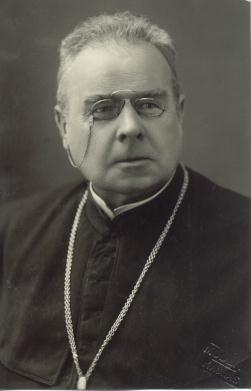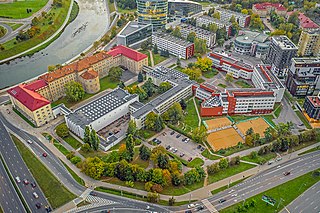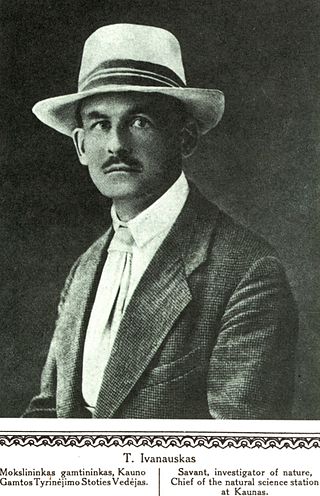
Kaunas is the second-largest city in Lithuania after Vilnius and an important centre of Lithuanian economic, academic, and cultural life. Kaunas was the largest city and the centre of a county in the Duchy of Trakai of the Grand Duchy of Lithuania and Trakai Palatinate since 1413. In the Russian Empire, it was the capital of the Kaunas Governorate from 1843 to 1915.

Aleksandras Stulginskis[ɐlʲɛkˈsɐ̂ˑndrɐs stʊlʲˈɡʲɪ̂nʲsʲkʲɪs](listen) was the second President of Lithuania (1920–1926). Stulginskis was also acting President of Lithuania for a few hours later in 1926, following a military coup that was led by his predecessor, President Antanas Smetona, and which had brought down Stulginskis's successor, Kazys Grinius. The coup returned Smetona to office after Stulginskis's brief formal assumption of the Presidency.

Vilnius University is a public research university, which is the first and largest university in Lithuania, as well as one of the oldest and most prominent higher education institutions in Central and Eastern Europe. Today, it is Lithuania's leading research institution, ranked among the Top 29% Higher Education Institutions in the world.

Maironis was a Lithuanian Roman Catholic priest and the greatest and most-known Lithuanian poet, especially of the period of the Lithuanian press ban. He was called the Bard of Lithuanian National Revival. Maironis was active in public life. However, the Lithuanian literary historian Juozas Brazaitis writes that Maironis was not.

Vytautas Magnus University (VMU) (Lithuanian: Vytauto Didžiojo universitetas, VDU) is a public university in Kaunas, Lithuania. The university was founded in 1922 during the interwar period as an alternate national university.

Kaunas University of Technology is a public research university located in Kaunas, Lithuania. Established in 1922, KTU has been one of Lithuania's top science education centers. According to rankings conducted in 2021, KTU was the second-best university in Lithuania. The primary language spoken in courses is Lithuanian, although there are courses that are taught jointly in Lithuanian and English or solely in English.

Kaunas Priest Seminary is the largest seminary in Lithuania serving the Roman Catholic Archdiocese of Kaunas. It is part of the Faculty of Theology of Vytautas Magnus University. Its current rector is Aurelijus Žukauskas. As of 2007, the seminary had 35 students. It traces its history to 1622.

Vytautas Magnus University Education Academy – an academical unit of Vytautas Magnus University, which specialized in preparing school teachers and other educators. Located in Vilnius and Kaunas, Lithuania.

Tadas Ivanauskas was a Lithuanian zoologist and biologist, and one of the founders of Vytautas Magnus University.

Klaipėda University is a university in the Lithuanian port city of Klaipėda.

The Enhancing Student Mobility through Online Support (ESMOS) project is a European-funded partnership between higher education institutions from Austria, Bulgaria, Italy, Lithuania and the United Kingdom. It has the aims of developing, evaluating and modelling the use of Virtual Learning Environments and online technologies to support students who take part in either a study exchange (ERASMUS) or work placement programme (LEONARDO), spending part of their studies overseas.
The Turkish National Police Academy is a public institution of higher education in Ankara, Turkey dedicated to the training of police officers. It was founded in 1937 and has offered a four-year undergraduate program since 1984.

The signatories of the Act of Independence of Lithuania were the twenty Lithuanian men who signed the Act of Independence of Lithuania on February 16, 1918. The signatories were elected to the Council of Lithuania by the Vilnius Conference in September 1917 and entrusted with the mission of establishing an independent Lithuanian state. The proclaimed independence was established only in late 1918, after Germany lost World War I and its troops retreated from Lithuanian territory. What followed was a long process of building the state, determining its borders, and gaining international diplomatic recognition. The signatories succeeded in their mission and independent Lithuania survived until the Soviet Union occupied the state on June 15, 1940.

Lithuanian Sports University or LSU is a university in Kaunas, Lithuania, specializing in sports, physical activities, and physiology. It is headquartered in Žaliakalnis neighbourhood, in close proximity to the Kaunas Sports Hall and the S. Darius and S. Girėnas Stadium.

Giedrius Antanas Kuprevičius is a Lithuanian composer and music educator.

Vilnius Gediminas Technical University (VILNIUS TECH) is a public university located in Vilnius, Lithuania. There are 10 faculties including Antanas Gustaitis Aviation Institute, Architecture, Business Management, Civil Engineering, Creative Industries, Electronics, Environmental Engineering, Fundamental Sciences, Mechanics, Transport Engineering. Scientific research and experimental development is performed by 13 institutes, 3 research centres and 23 research laboratories.
The Lithuanian Catholic Federation "Ateitis" is a youth organization in Lithuania uniting Catholic-minded schoolchildren, university students, and alumni. Ateitis is a member of the umbrella of Catholic youth organizations Fimcap. Members of the Ateitis Federation are known as ateitininkai.
Petronėlė Lastienė née Sirutytė was a Lithuanian teacher and university professor. She was recognized as one of the Righteous Among the Nations for rescuing Jewish children from the Kaunas Ghetto during the Holocaust.

Viktoras Pranckietis is a Lithuanian agronomist and politician. He was the speaker of the Seimas.
Vytautas Šlapikas is a Lithuanian chess player who holds the title of International Master. He is winner of Lithuanian Chess Championship (1996).




















